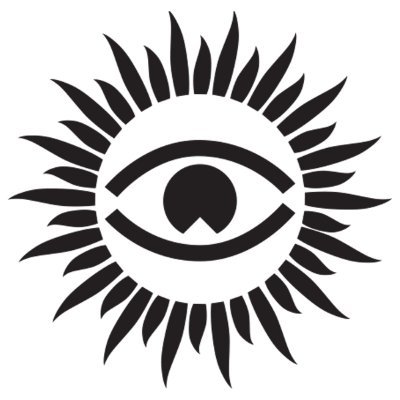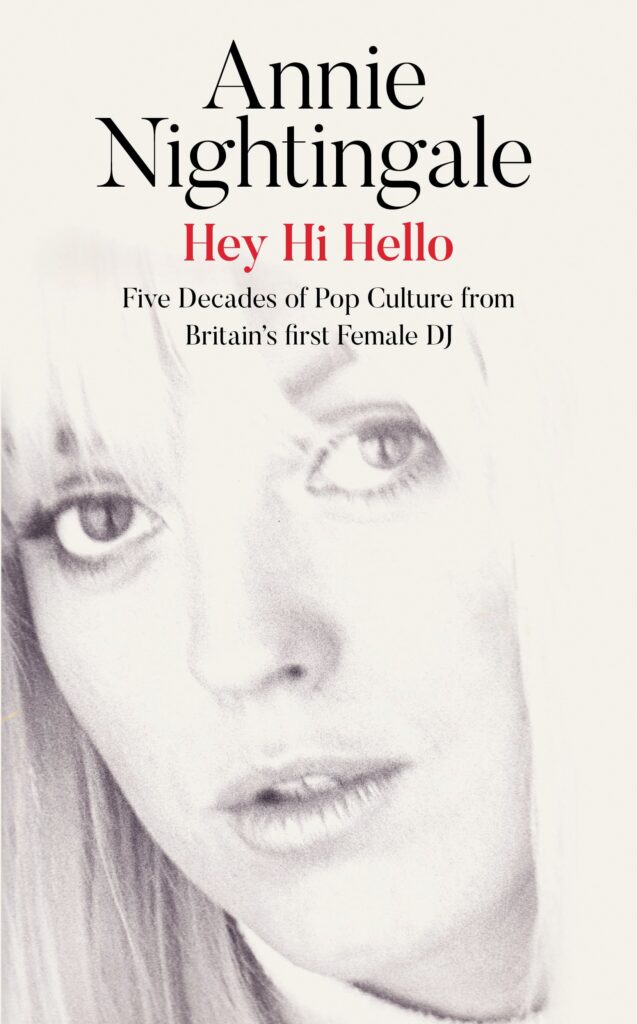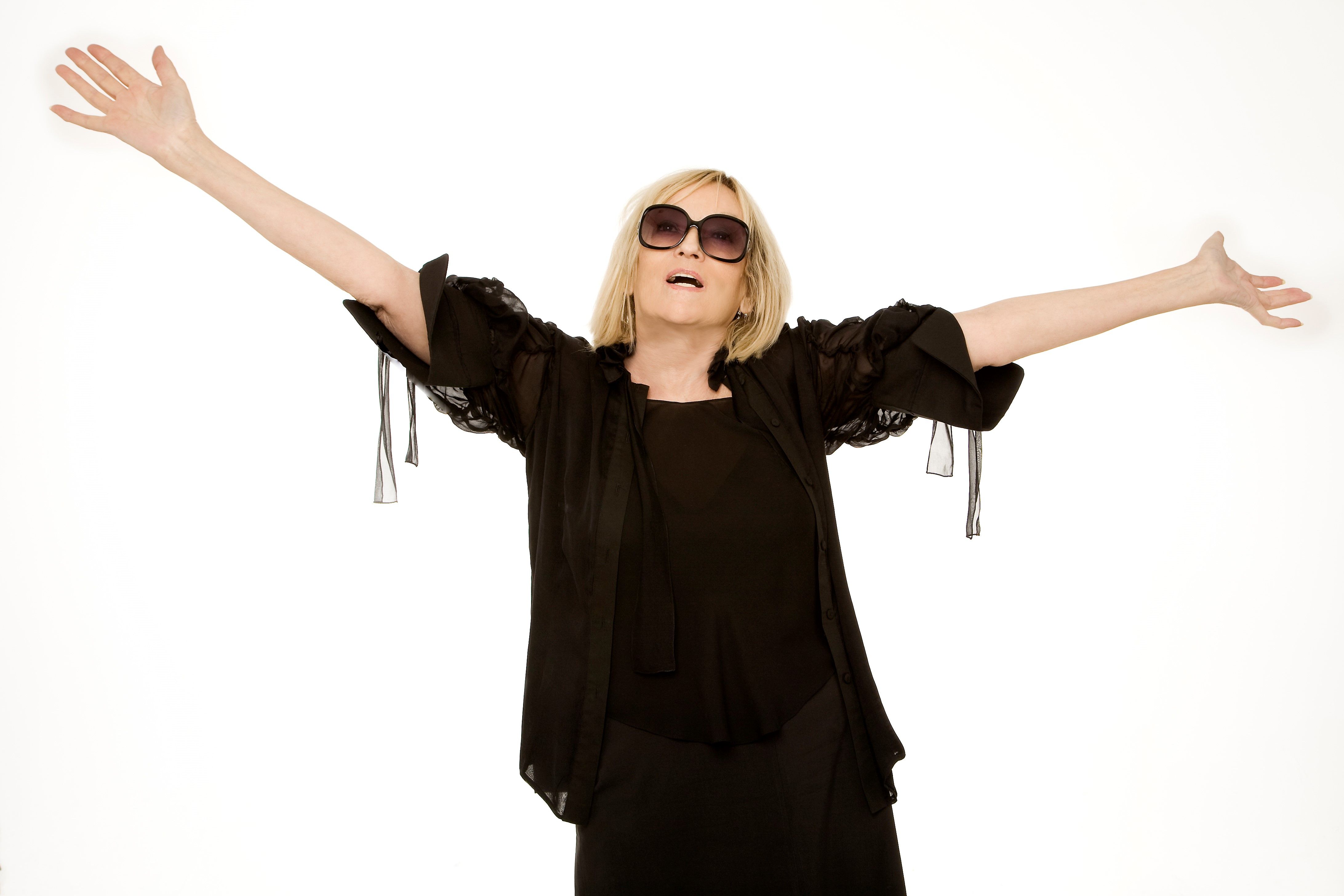Today, September 3rd 2020, is perhaps the most demented day in British publishing history with over 650 titles released. I doubt there will be many titles from figures as righteous and influential as Annie Nightingale, the First Lady of Radio One, acid house pioneer, broadcasting legend of five decades. Hey Hi Hello is her story and it is, of course, extraordinary. We are thrilled to bring you this chapter from the book; the events of which take place in our very own bar. We hope to see Annie down there soon but for now we raise a virtual glass to the Doyenne of British Broadcasting, Annie Avril Nightingale CBE.

A special day. In France it’s the Fête du Muguet: Lily of the Valley Day; on trend there from 1 May 1561. King Charles IX of France doled out to each lady in his court a sprig of these delicate, white, bell-shaped spring flowers, cloaked in thick, green, enveloping leaves. For good luck. The idea caught on, and the tradition has been going on ever since. Very Instagrammable.
But in France and elsewhere 01.05 is much better known as International Labour Day and is in many countries a public holiday. Celebrating workers’ rights. By the year 2000 it had become an unofficial protest day in the UK, especially in central London. And of course, Mayday is the internationally recognised distress call.
In 2001, it was the date I was invited to attend an investiture at Buckingham Palace. To receive the MBE from the Queen.
Oh, I had thought long and hard about accepting this. It was completely unexpected. A cream envelope addressed to me at Radio 1, when letters were still a thing. Because of the insignia on the outside, I along with others given these awards, thought it was a tax demand.
I confided only in John Peel, who’d already got an OBE. ‘What do you think? Should I accept it?’
‘Look at it like this,’ he said. ‘If you turn it down, you’ll be in the pub one day, and the topic of these “gongs”, and whether they’re right or wrong will crop up. You can say: “Oh I was offered one of those and I turned it down.” And people will go, “Oh really?” and start talking about something else. But if you accept? Well, think of it this way, it’s a great day out.’
Quite what a day out, he could not have possibly imagined.
Trouble had been brewing big on May Day the year before, in 2000. A protester had draped a grass-covered strip of turf, carefully positioned, onto the bald head of a Winston Churchill statue in Westminster. Thus, giving him an incredibly pictorially newsworthy bright-green Mohican punk hairstyle. This was on a day of demonstrations and anti-capitalism protests.
A McDonald’s in the Strand had had all its windows smashed in. In general, the police were criticised for being too lenient. Well, that was not going to happen again, was it?
For the anticipated May Day protests of 2001, an extra 6000 police officers were drafted in. I had other things on my mind in the days leading up to it.
If I was going to accept the gong, then it was going to be a good excuse for a full-on celebration. With the promotion team at Radio 1 we scoured the capital (well, not exactly scoured, licence fee payers, I assure you), looking over some suitably iconic venues. One of the most inspired ideas was to hold an event actually on, across the top of, Tower Bridge! You know, the one that opens and closes its road across the Thames to let the traffic cross. Almost as well known a London landmark at Buck House itself.
We went on a very exciting, to me, recce. It appears that there are events held inside the long glass-walled fixed structure which spans both towers of the bridge. I had no idea.
Then came the three crunch questions from me. How much?
How loud?
How late?
The Tower Bridge ents team could not tick any of the right boxes. Fine for a no-expense-spared early evening swish corporate do, but no good for a late-night acid house rave-up. In case you were thinking of it, too.
It’s quite difficult to come up with a really never-been- done-before location that’s central enough for everyone to get the tube home from afterwards. Sometimes the solution is staring you in the face. It was then. It was called the Social, a friendly, lozenge-shaped bar, ground floor at street level, with a corresponding-shaped DJ and dance area in the windowless basement below. The lighting in the basement is of such softly glowing subtlety and trickery that you can you never tell if it’s morning, noon or night. Deceptively seductive for a long, long night of musical merriment.
I already knew it well. Still have the original metal membership tag on a key ring. The Social was an offshoot project of the Heavenly record label. The bar, looking like a small shopfront, was/is situated in a side street just off Great Portland Street. Technically in ‘Noho’, the north side of Oxford Street. Or more poshly known as Fitzrovia. Or more accurately known as the heart of the rag trade district. A stone’s throw from two tube stations.
And as was in those days, but a pebble-chucking (oops, not a good analogy given what was going to happen) distance down the street from Radio 1’s base.
It was booked for the night. The invitations were designed by me, printed and sent out.
Rather worryingly, hardly anyone replied. The recipients hadn’t ‘got’ the meaning of the design. Which was three rows of sailors flag-waving the semaphore signals for Mayday! Mayday! Mayday! The international distress call. I had also written inside that the celebrations would be held on May Day 2001.
Then I started getting the calls: ‘Yeah but when is it?’
‘On May Day,’ I replied, ‘as it says on the invitation.’
‘When’s that?’
‘The first of May. When it usually is. Look on the front of the invite – the flags spell out Mayday in semaphore.’
‘What’s semaphore?’
Something, everything, had got lost in the concept. In the manner of Spinal Tap’s Stonehenge, the images of the sailors’ flags had turned out to be much tinier, more miniscule than I had envisaged.
So no one understood the imagery. Or understood the meaning, or the date. Maybe no one would show up. I began to worry about that. And if you think that it’s unreasonable to consider that no one would show when there’s a free bar to be had, may I disagree? It had happened to me.
In my younger days of fronting a string of fashion boutiques, I had sent out invitations to the opening of a new branch and a party to which everyone would be transported. From central London to Kent, by drinks-laden double-decker bus.
The only person who turned up to the parked bus on Charing Cross Embankment, was – so, so ironically – the legendary ‘fifth Beatle’ Harry Nilsson. Him of ‘Everybody’s Talkin’ or more latterly if you’ve discovered him recently singing his revived ‘Gotta Get Up’ theme tune on the Netflix series Russian Doll.
And Harry had bothered to arrive at the outset, to say that he wouldn’t be able to come to the party on the bus. But at least he’d bothered to show up and tell me in person. No one, but no one else did.
So I had form in the calamity no-show party stakes.
Meanwhile a bridgehead and ops centre was set up to direct activities to and from Buckingham Palace, on the actual May Day. A make-up artist and friend, Liberty, showed up at a necessary excruciatingly early hour. The three allowed guests to this investiture were my only close relatives . . . uncle, son and daughter. My uncle Harold, aka Bill, had served in the British army in the Second World War in Italy, and I believe had suffered undiagnosed PTSD ever since.
I’m sure he had been recognised for his service, but this had not included a trip to the Palace. He duly donned a morning suit for this occasion, though I felt there was a slight question hanging in the air. Why was a mere DJ (hardly a life-threatening occupation) receiving this recognition?
Bill was a youthful eighty-six at the time. We were to convene at the former Churchillian favourite the Hyde Park, now the Mandarin Oriental Hotel, whizz round the corner to Buck House, then scoot back there with some mates to launch the daytime celebrations.
Hundreds, thousands of people receive the MBE and above, every year. Hence the Palace courtiers handle the shuffling guests with, well, experienced aplomb.
Without wishing to be iconoclastic, the Palace is decorated as the royals approve, although opulent, not what you might call any modern glitz or bling. The ancient and treasured carpets are worn in some places. Investiture guests are given water to drink, not champagne. Which is fine by me. The interior of the public rooms of Buckingham Palace, St James’s Palace, Kensington Palace and Sandringham are presented in a similar way. I can say, having been a guest at these palaces too.
The sumptuously bouquet and multi candle-lit Palace sets of the TV series The Crown, by comparison, are much more lavish than the real thing.
Everyone on May Day was very respectfully dressed. Ascot numbers of hats.
I was most gratified to be donated a one-off prototype design white tuxedo coat that had never gone into production (therefore not duplicated) by the young British designer Luella Bartley. With that I wore turquoise ankle boots and no hat. I looked around for anyone else who might have gone for unconventional attire.
Ah, there were a couple of big, youngish-looking blokes hanging out together, one wearing what looked like purple sparkly Doc Martens. Which certainly outdid my vivid blue Parisian heels for unsuitability at the Palace. I introduced myself. The couple turned out to be the Olympic gold medallist oarsmen Matthew Pinsent and James Cracknell.
As I had grown up by the Thames, I’d known quite a few schoolboy rowing crews. Attended a lot of waterside regattas in my early teens, before rave took me over. Once in conversation it was quickly established that James Cracknell had been a pupil at Kingston Grammar, a neighbouring school to mine, the Lady Eleanor Holles School, Hampton.
‘We called you lot Lady Eleanor Horrors,’ cracked Mr Cracknell.
Cheers, I said. After an extraordinarily competitive career as an athlete, James Cracknell joined the Strictly Come Dancing competition for 2019. Those purple sparkly shoes he wore at the Palace that day seem to have turned out to be quite prescient.
Receiving a decoration from the Queen or one of her family is very much the school prize-giving. You politely watch and clap as all the other recipients file past . . . How on earth can the Queen find anything to say to all these hundreds of her subjects? Apart from: ‘Have you come far?’
I thought, well I’ll make it a bit easier for her when it comes to having my badge pinned onto me. Breaking with Palace protocol (as did apparently my Radio 1 colleague Nick Grimshaw when he was presented) I spoke first. Just to try to be friendly and helpful really. I’d found Prince Charles, when I worked for the Prince’s Trust, and even more so Diana, Princess of Wales, extremely approachable. But then, they were not the monarch.
‘Radio 1 DJ,’ I offered. At that time Prince William had been widely publicised as having a go on the decks during his gap year in Chile. So I ventured further: ‘I hear your grandson has been DJ’ing recently too.’
And how did the Queen reply to my carefully selected nugget of topicality?
‘Probably.’
That’s all she said. Just the one word, ‘Probably.’
She could have said, ‘To the Tower for impertinence. Off with her head.’ In the 2020 New Year’s honours list, my MBE was ‘upgraded’ to CBE. The investiture was postponed due to lockdown. Should I be first to address the monarch again?
Probably not.
It was only on leaving the palace in 2001 that anyone noticed the snipers on the roof.
And heading back to Knightsbridge to raise a glass or two, I still had no idea of the growing confrontation in the West End.
By mid-afternoon, the May Day protesters were gathered along Oxford Street, and in and around Oxford Circus. But the police were creating pincer movements and driving the crowds into closed, contained, circled groups. There was a name for this tactic, but I didn’t know it yet.
It was only when I reached my home in north-west London for a regroup that I got the news. Radio 1 had cancelled my party.
‘What? What? Why?’ I hollered, horrified, down the phone to the producer. By now the party invitees and acceptees had swelled in numbers, and there were friends planning to come from Brighton, Paris, Los Angeles, as well as from all over London.
‘It’s too dangerous,’ the producer told me. ‘The whole area is sealed off. No one from Radio 1 is allowed to come to the party. It’s off.’
We’ll see about that, I thought.
I phoned for a minicab and headed to the West End. On this day my driver was a rather dashing grizzled veteran from Montenegro in a Mercedes. He drove the aged, low-slung, left-hand drive, military-green motor like it was a Sherman tank. He growled dismissive contempt at my suggestion that our route might be blocked before we could get to the Social bar.
Ahead, right across the dual carriageway of Portland Place, was a solid line of shield-wielding riot police.
Overdoing it a bit, chaps, I might have thought to myself.
It’s hard now to convey that feeling of innocence in the air, the sense of bewilderment at this extraordinary police presence in the centre of London. Since the Good Friday Agreement there were no more IRA bombs threatening Oxford Street shoppers. We didn’t really know the term ‘lockdown’ then. 9/11 was three months into the future. Peaceful protest was tolerated or had been. The riots of the seventies and eighties were in the past; love bombing was more the thing now. Hugging strangers. Giving the peace sign. The acid house influence of the nineties was still going strong in my milieu in 2001.
But now, along Great Portland Street, which runs parallel to Portland Place, the whole area dominated by the BBC’s HQ, Broadcasting House, was a shocking sight.
A solid line of police horses ranged right across the now deserted street, swept clean of office and shop workers, garment makers, stray tourists. Middle of the afternoon, eerily empty.
So . . . They certainly meant business, then.
My own situation now loomed into reality. What to do? I had many invited guests who were not employed by Radio 1, who were, to be fair, entitled to stop their own employees wading into a riot and possible arrest. Can’t imagine what the Health and Safety lot would say now.
But my own friends, and friends of family, were of, shall we say, a different ilk. There was for instance, Mani of the Stone Roses and Primal Scream fame. His trademark phrase was: ‘I was born to ’ave it, and ’ave it, I surely will.’ And often did.
Then there was Irvine Welsh. The now superstar author of the blockbuster and era-defining Trainspotting. Irv certainly lived up to the image of some of his fictional anti-heroes.
Basement Jaxx, then and now festival headliners, had agreed to DJ at the Social party. Although we had mobile phones in those quaint old days of the early twenty-first century, coverage was not what it is today. I didn’t have their phone numbers anyway, so couldn’t cancel their set. I needn’t have worried. They gamely crossed town from Brixton and showed up anyway. Others fought their way among panicked tube passengers, as central London was gradually completely closed down to transport.
For anyone who had battled through the police lines and reached Little Portland Street, the Social now became something resembling a Chicago speakeasy in the 1930s. The heavily manned front door was opened a crack. Any proven legit guest would be grabbed by the shoulders, hauled swiftly inside, and the door to the street slammed firmly shut again.
Get in quick, stay in, don’t wander outside again if you don’t want to get arrested, was the very sound advice.
The contemporary sounds of the Chemical Brothers and Death in Vegas were blaring out of the Social’s jukebox. In addition to these, I found some other lyrics of a musical number from The Pajama Game, which I’d seen as a teenager in the fifties, running through my head.
Just knock three times and whisper low That you and I went sent by Joe
Then strike a match and you will know You’re in Hernando’s Hideaway
Olé!
I’d had to blag my way through the police cordon to get into my own party
‘But officer, this is to celebrate me getting the MBE at Buckingham Palace today.’
‘’Course it is, love.’
(Well I’d have thought it was a pretty lame line too, tbh.) Inside, the bar was rammed, a roadblock to use an at that time unironic clubbing term. The by now already partied-up gang inside saw me make my anxious entrance and began chanting, ‘Ann-ie, Ann-ie.’
That was almost too much of an emotional overload.
They always say you shouldn’t really enjoy your own party too much if you’re hosting it properly. Well, the rest of the day was spent greeting guests, getting them drinks, rushing up and down the concrete staircase to the DJ area. All those behind the decks were appearing without a fee, so needed to be looked after in every other way.
Casual and relaxed it was not. Uproarious and rambunctious it certainly was.
The aux barricades attitude was unlike any other party I could remember.
Of course there were some, there always are, who ignored the door advice about staying inside the Social bar. Naturally we all wondered what was going on outside. Not so easy pre-Twitter, WhatsApp and Instagram days.
So a few members of my party (Robin Turner of Heavenly Records, included) did venture out.
And did not – could not – return.
The defiant ones had been ‘kettled’ by the police.
I’d never heard the term before. But it has been widely used by the Met ever since. Enclose a group of protesters, demonstra- tors, inside a street police cordon, and don’t let them leave. For hours if necessary. No excuses heeded about needing the loo, or getting back for a babysitter. The police exercise was to marshal you, contain you, for as long as they deemed necessary.
If you got kettled, you stayed kettled.
Kettling, from the Met’s point of view, has proved to be an effective deterrent to protestors not of sufficient stoicism or polit- ical conviction. Sinister.
Eventually the party inside the Social wound down. It was deemed safe to leave, the streets were clear. The hard core remained.
We needed an after-party. And there was only one place to go, though we were so near the heart of late-night Soho.
Known to party organisers and club DJs as somewhere to go when everywhere else had closed, it was on Hanway Street, itself a tiny sliver of an alley woven deep in the heart of central London. It crosses diagonally from behind Oxford Street, opening up again into Tottenham Court Road. At one time it had five record shops. It was also known for drug transactions. On one corner, its open though discreet door, the Spanish bar. An enclave for homesick or ex-pat Spaniards.
Live flamenco was played and danced downstairs. It was also a secret home from home for late-night London ravers.
No membership, no door policy, no door fee, no dress code. No questions asked. Heaven (as distinct from the club Heaven, not so far away).
We fell in there in the early hours of 2 May 2001, to unwind finally.
And all you’ll see are silhouettes And all you’ll hear are castanets And no one cares how late it gets You’re in Hernando’s Hideaway. Olé . . .
As to the actual medal, the MBE itself, I have it somewhere, safely stored at home. I keep everything (I’m a hoarder), but just not always sure exactly where….
Mislaying of belongings became a bit of a thing during a further visit to the Palace, some four years later.
Along with, I must say, I thought the most hilariously motley posse of guests imaginable. Among the 500 invited, Jimmy Page, Petula Clark, Eric Clapton, Shirley Bassey, Beth Orton, Dame Vera Lynn, Jeff Beck, Kate Bush, Jamie Cullum, ‘Spice Girl’ Geri Halliwell, Brian May of Queen, and most unexpectedly, to me, Jeannette Lee, ex of Public Image Ltd, an architect of punk, friend of John Lydon who had written the immortal words:
God Save the Queen She’s not a human being There’s no future
And England’s dreaming
It was a reception to celebrate Britain’s music ‘industry’. This time the drinks were flowing and her Maj and consort looked much happier than pinning badges on total strangers. They were milling through the throng, stopping and chatting, it seemed pretty much willy-nilly.
I buddied up with Beth Orton.
Eric said he hadn’t seen me for ages.
Jimmy Page (former Prince of Darkness) chattily remarked, like he was a South Downs commuter: ‘Didn’t I see you on the train today?’
The gin was flowing (not my usual tipple, but hey, when in Buck House . . .). Proving that four decades do nothing to diminish rivalry, no matter how friendly, Jeff Beck was immensely amused that the Queen had not been cognisant of the extent of Eric Clapton’s extended worldwide reputation as god of the guitar.
‘Have you been playing long?’ she was reported to have asked him.
‘About forty-five years,’ was his purported reply.
But Jeannette Lee? PiL? at the Palace? Somehow, an unlikely splinter group of herself, myself, Beth, Jeff Beck and the pianist Jamie Cullum split together and retired elsewhere for a further ‘round’. After that, Jeannette, who was now co-running the Rough Trade record label, and I shared a taxi back to west London.
Someone had to let me into my flat.
The next day I called Buckingham Palace to say, ‘Sorry to bother you guys, but I was at a party at yours last night, did anyone find my keys?’
Annie Nightingale
You can order Hey Hi Hello HERE!


